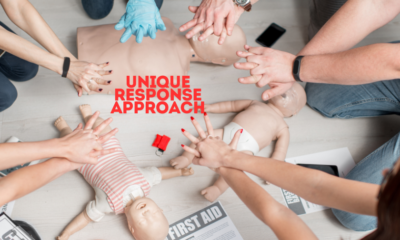Health & Fitness
Severe Depression: Understanding The Depths of Despair

Depression is not just a feeling of sadness or a temporary lull in your daily activities. It is a serious medical condition that impacts millions of people globally and requires immediate attention and sustained care. The most severe form of this condition, often termed major depressive disorder or clinical depression, engulfs an individual’s life in a thick fog of despair, hindering both personal and professional growth.
In this article, we explore the concept of severe depression, its debilitating consequences, the phenomenon of treatment-resistant depression, and the need for community, professional, and personal support in the journey toward mental health.
Major Depressive Disorder: More Than Just A Bad Day
Major depressive disorder, commonly known as clinical depression, is characterized by persistent and intense feelings of sadness, hopelessness, and a lack of interest or pleasure in daily activities. It is not a condition to be taken lightly or dismissed as mere mood swings or emotional fragility. The term “major” denotes the severe and debilitating nature of the symptoms, which often interfere with basic functions such as sleeping, eating, and working.
One of the distinctive characteristics of major depressive disorder is the complexity and persistence of symptoms. While it is common for individuals to experience periodic episodes of sadness or emotional exhaustion, major depressive disorder lingers and invades every aspect of an individual’s life, making it increasingly challenging to manage responsibilities or maintain healthy relationships.
Clinical Depression: A Deeply Debilitating Experience
Clinical depression often comes with a wide range of symptoms that can vary in intensity. These can include excessive fatigue, loss of appetite, suicidal thoughts, or even physical pain such as headaches or backaches. In severe cases, the condition can lead to complete withdrawal from social activities, or even suicidal ideation.
Moreover, clinical depression affects not just the individual but also their circle of friends, family, and colleagues. The energy required to manage such an intense form of depression often leaves the person exhausted, making it difficult for them to engage in normal interactions. The ripple effects of clinical depression can lead to the deterioration of social networks, further exacerbating the feeling of isolation and loneliness.
Treatment-Resistant Depression: When the Path to Recovery Isn’t Straightforward
The quest to find effective treatment options for major depressive disorder is a topic of ongoing research and discussion in the medical community. Unfortunately, for a subset of people dealing with severe depression, traditional treatments like medications and psychotherapy may not yield the desired results. This condition is known as treatment-resistant depression.
Those who suffer from treatment-resistant depression may often feel frustrated or disheartened due to the ineffectiveness of treatment options. This can create a vicious cycle where the individual loses faith in the possibility of recovery, worsening the severity of their depression. It is critical for healthcare providers to understand this variant of major depressive disorder in order to tailor treatment plans that can break the cycle and offer a glimmer of hope.
Mental Health: A Community Responsibility
The conversation about severe depression cannot be complete without discussing the overarching issue of mental health. There is a burgeoning awareness around the importance of mental health, but the stigma surrounding conditions like major depressive disorder still exists. This often results in individuals suffering in silence, sometimes due to shame or fear of judgment.
Promoting mental health goes beyond just individual responsibility; it extends to families, friends, and society at large. It is crucial for communities to be educated about the seriousness of conditions like clinical depression and treatment-resistant depression so that they can offer effective support. Support groups, peer counseling, and community-led mental health initiatives can go a long way in making mental health care accessible and acceptable.
Support: The Cornerstone of Recovery
Lastly, but most importantly, the journey through major depressive disorder or clinical depression is not one that should be undertaken alone. The importance of a solid support system—be it family, friends, or healthcare professionals—cannot be overstated. Support plays a vital role, not just in the early identification of symptoms but also in sustaining treatment plans and encouraging progress.
Psychological counseling and medications can go a long way in alleviating the symptoms of depression, but emotional support provides the mental fortitude to continue fighting the battles, both big and small. When faced with the complexities of treatment-resistant depression, a robust support system can often be the critical factor that makes the arduous journey toward mental health more bearable.
Further Reading: A Dive Into Research
For a broader understanding of psychological distress in a healthcare setting, a pivotal research article titled “Understanding persons with psychological distress in primary health care” provides important perspectives. Published in the Scandinavian Journal of Caring Sciences, this paper aims to investigate the experiences and needs of individuals with psychological distress within the primary health care system.
The article offers important insights by drawing on qualitative research methods to explore the experiences of patients. It uncovers how the healthcare system often underestimates or inadequately addresses psychological symptoms. The paper accentuates the need for individualized, person-centered care, emphasizing that each individual’s experience with psychological distress—whether that’s clinical depression, major depressive disorder, or other forms of emotional anguish—is unique.
In comparison to other research, such as those focusing solely on the efficacy of medications or psychotherapies in treating symptoms of severe depression, this article adds an important dimension by focusing on patient experiences and systemic issues in primary healthcare settings. While the effectiveness of medications and therapies should not be discounted, this research elevates the dialogue by highlighting the importance of understanding patient experiences and needs, which can often be overlooked in the quest for a ‘quick fix’ via medication or short-term therapy.
The findings of this research can be especially valuable for healthcare providers and support networks involved in the treatment of major depressive disorder or treatment-resistant depression. Being aware of the emotional and systemic challenges that patients face can be an important factor in creating more comprehensive and effective treatment plans. Given that support is integral for mental health, the holistic approach recommended by this paper supports the argument for a more comprehensive understanding of patient needs.
The Link Between Severe Depression and Suicidal Tendencies in Men
The research article titled “You feel like you can’t live anymore”: Suicide from the perspectives of Canadian men who experience depression offers a comprehensive look into how severe depression is closely associated with suicidal tendencies, particularly in men. Published in Social Science & Medicine, the study employs in-depth interviews to explore how men with depression perceive and interact with the notion of suicide. The research indicates that men often adopt coping mechanisms that may differ from those commonly used by women, such as withdrawal from social interactions or excessive engagement in work or physical activities.
However, these coping strategies often serve as temporary fixes and may not address the root causes of their severe depression or despair. The article suggests that traditional masculine ideals, which discourage emotional vulnerability, could contribute to the reluctance of men to seek professional help, exacerbating their risk for suicide. As such, it raises important considerations for mental health professionals and support networks involved in the treatment and support of men facing severe depression and suicidal ideation.
There is Always Help
Remember, major depressive disorder, clinical depression, or treatment-resistant depression are conditions that can be managed and treated with the right combination of professional help and personal support. The first step toward recovery is recognizing the severity of the condition and seeking help. There is light at the end of this dark tunnel; sometimes, we just need someone to help us find the switch.
Authors: Doctor Ashok Bharucha and David Dardashti
-

 Press Release7 days ago
Press Release7 days agoCrypto WINNAZ Launches First On-Chain Yield Engine for Meme Coins, Enabling 20x–300x Returns
-

 Press Release4 days ago
Press Release4 days agoBellarium ($BEL) Price Prediction: Could It Hit $5 by 2026?
-

 Press Release1 day ago
Press Release1 day agoClinical Trials Market Set for Robust Growth, Driven by Drug Development Surge and Digital Innovation
-

 Press Release2 days ago
Press Release2 days agoPreventive Vaccines Market to Witness Strong Growth by 2035
-

 Press Release2 days ago
Press Release2 days agoFill-Finish Pharmaceutical Contract Manufacturing Market Expected to Flourish Amid Biopharmaceutical Boom and Global Outsourcing Trend by 2035
-

 Business3 days ago
Business3 days agoHow Managed IT Solutions Help Small Teams Compete at Enterprise Scale
-

 Press Release2 days ago
Press Release2 days agoGreen Bio Chemicals Market Poised for Sustainable Growth amidst Global Shift to Eco-Friendly Alternatives by 2035
-

 Press Release2 days ago
Press Release2 days agoIndustrial Boiler Market Expected to Surpass USD 24.4 Billion by 2035 Amid Growing Demand for Energy Efficiency and Industrialization






























